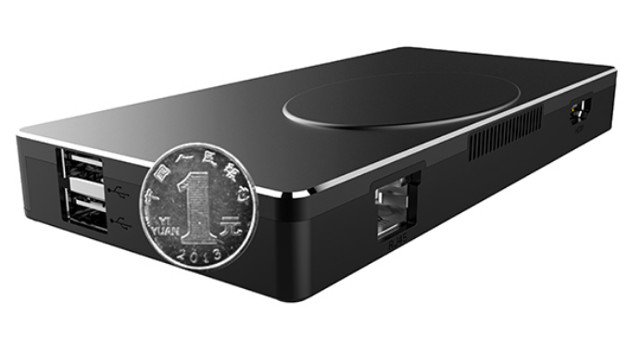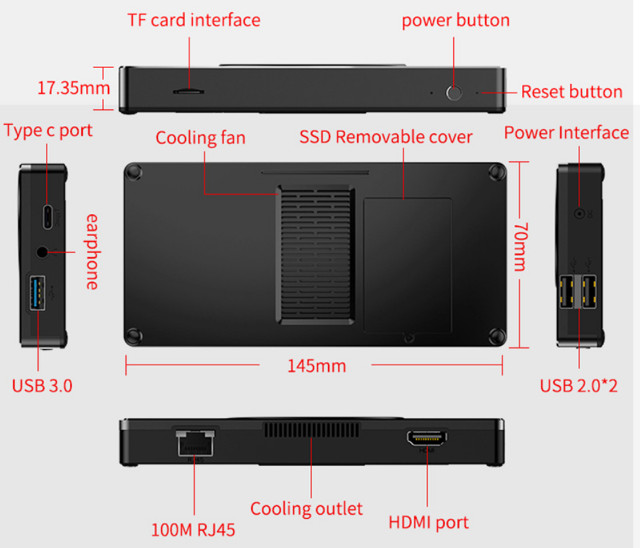The first Apollo Lake mini PC available from China was Voyo V1 VMac Mini with a Celeron N3450 or Pentium N4200 processor, but there’s now a new model with Bben MN17A with Celeron N3450, 4GB RAM, and 32GB eMMC flash, and the ability to add your own storage via an SSD bay.
 Bben MN17A mini PC specifications:
Bben MN17A mini PC specifications:
- SoC – Intel Celeron N3450 quad core processor @ 1.1 GHz / 2.2 GHz and 12 EU Intel HD graphics 500 @ 200 MHz / 700 MHz; 6W TDP
- System Memory – 4GB DDR3L (up to 8GB)
- Storage – 32GB eMMC flash (Options for 16, 64 or 128 GB) + mSATA SSD bay + micro SD slot up to 128 GB
- Video Output – HDMI 1.4b port up to 4K @ 30 Hz
- Audio – HDMI + 3.5mm audio jack
- Connectivity – Fast Ethernet, dual band 802.11 b/g/n/ac WiFi, and Bluetooth 4.2 (Intel 3165 wireless card)
- USB – 1x USB 3.0 port, 1x USB 3.1 Gen 1 (5 Gbps) type C port, 2x USB 2.0 ports
- Misc – Reset and power buttons, power LED
- Power Supply – 12V/1.5A via power barrel or USB type C port
- Dimensions – 145 x 70 x 17.35 cm
The device comes with a fan, so we’ve yet to get an fanless Apollo Lake mini PC coming out of China. The specifications are fairly similar to the ones of Voyo VMac Mini, except for the slower Fast Ethernet port, a full HDMI port replacing a mini HDMI port, and better wireless connectivity with 802.11 ac and BLE 4.2. The SATA bay is a small advantage over Voyo VMac Mini which can also be upgraded but needs a teardown. The product page does not mention whether it’s an mSATA or M.2 interface, but after a chat with Bben, they confirmed it was a mSATA interface.
You can get the computer with 4GB RAM and 32GB for as low as $175 shipped, as long as you select an unlicensed version of Windows 10. If you want an activated version of Windows 10, it will cost you $14.50 extra. You may also consider purchasing from BBen official Aliexpress store instead with pricing starting at $167.50 + shipping. For reference, Voyo V1 Vmac Mini mini PC with Celeron N3450, 4GB RAM, 64GB eMMC flash, and Windows 10 Home activated sells for $159 including shipping.
Via AndroidPC.es

Jean-Luc started CNX Software in 2010 as a part-time endeavor, before quitting his job as a software engineering manager, and starting to write daily news, and reviews full time later in 2011.
Support CNX Software! Donate via cryptocurrencies, become a Patron on Patreon, or purchase goods on Amazon or Aliexpress






@cnxsoft:
When copying over product specs please take care that you remove the ‘USB 3.1’ BS. The USB Type-C connector is version agnostic and the SoC is only capable of USB 3.1 Gen1 which is the same as USB3.0 from a consumer point of view (since consumers don’t care about details but associate USB 3.1 with 10Gbps and USB 3.0 with half the speed and USB 3.1 Gen1 is only that: 5Gpbs with inefficient/traditional 8b10b encoding so it’s even less than half the speed since the 10Gbps variant uses the way more efficient 128b/132b encoding).
In other words: The existence of an USB Type-C connector tells you nothing about USB capabilities (both regarding data transmission and power delivery) and USB 3.1 usually means USB 3.0 if not otherwise specified (‘SuperSpeed+’, ‘USB3.1 Gen2’ or mentioning 10Gbps). So unless you can verify it’s 2nd Gen USB3.1 better leave out this versioning BS at all when Type-C connector is mentioned 🙂
@tkaiser
OK. The problem is that sometimes it’s “type C” @ USB 2.0 speeds… So it’s still good to indicate some version. I’ll double check the processor capabilities, and update the post with 5 Gbps.
BTW: This here is a rather short explanation on all this recent USB confusion: http://www.tomshardware.com/news/usb-31-usb-type-c-refresher,29933.html
Those version number terminology was never intended to be used for marketing purposes but instead ‘SuperSpeed USB’ and ‘SuperSpeed USB 10 Gbps’ should have been used. But of course this ignores that consumers prefer data (plain numbers) over information and so manufacturers/OEMs are happy to sell stuff as USB3.1 capable which is only SuperSpeed compliant.
@tkaiser
Intel has not (publicly) released datasheets nor specifications for their Apollo Lake processors. So it’s quite difficult to find info. All I can see is an Acer N3450 Chromebook that is limited to USB 3.1 Gen 1 (5Gbps). Maybe it’s good enough as confirmation…
@tkaiser
I don’t like it when they do that: separate technical and marketing terms.
Once I tried to buy a 1080p TV, and there was a lot of miscommunication with the seller. He was unclear what I was talking about, and he said they only have “HD Ready” or “Full HD” TVs, and I had never ever heard those names at the time, and I had to come back home to find out HD Ready = 720p, and Full HD = 1080p.
It’s like with all those display resolutions: qHD, QHD, QWVGA… It never rings a bell to me, and always have to look up the actual resolution.
@cnxsoft
What about https://ark.intel.com/products/95596/ ? Intel seems to be honest and calls ‘USB3.1 Gen1’ still USB3.0 unlike all those OEMs/manufacturers that love to use USB version number scheme to fool customers.
BTW: By looking at SoC specs I realized that this one doesn’t have integrated Ethernet. Are there really Fast Ethernet controllers out there with PCIe interface or is this even USB Ethernet here?
@cnxsoft
Well, USB marketing terms were pretty clear but unfortunately also somewhat stupid: FullSpeed being slower than HighSpeed while SuperSpeed really great as abbreviation especially in Europe and stuff like ‘SuperSpeed USB 10 Gbps’ simply to long to be used.
So it was obvious that technical version/generation numbers were also used on the market to differentiate but now with USB3.1 Gen1 being more or less the same as USB3.0 while every consumer expecting twice the performance when reading 3.1 consumers start to get a problem — technical committees like USB IF should maybe get more in touch with market reality. Then this could’ve been avoided by naming the ‘faster USB’ USB 3.2 instead. Now the mess is there, many sellers simply name every device with an USB Type-C connector USB3.1 capable and it’s up to the consumer in question to educate himself.
But you can’t help anyone who buys this kind of devices solely by looking at specs anyway.
I doubt you’ll see many fanless Apollo Lake systems since the lowest power version is 6w, Willow Trail the 2w version wasn’t released.
@Chris
It can be done, but it just needs a bigger heatsink. MINIX NGC-1 is an example of fanless mini PC with a processor dissipating 6W TDP max.
hi,
os supported linux??
@wookdong
Usually, Linux support is not an issue.
1. Either there’s a switch in the BIOS to set Linux boot
2. If not, you can use reFInd or isorespin.sh script: https://www.cnx-software.com/2017/03/29/isorespin-sh-script-updates-ubuntu-iso-files-with-mainline-kernel/